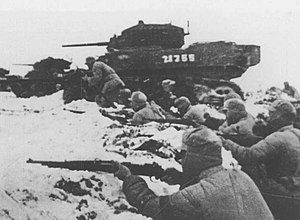 |
| PLA soldiers with captured American rifles and an M5 Stuart |
Coming in at number eight we have the Battle of Huai-Hai was
the final major fight between Communist China and Nationalist China in the Chinese
Civil war. It is also been called the Battle
of Hsupeng, Battle of Xu-Beng and the Huaihai Campaign and was fought between
November 1948 and January 1949. It was an incredibly decisive battle in which
over half a million Nationalist Chinese soldiers were killed and the political
impact for Nationalist leader Chiang Kai Shek and it dramatically alters the
Cold War.
Background:
The Chinese Civil war had begun in 1927 but was suspended in 1936 so that the Chinese
could unite to defend against the Japanese invasion. The Nationalist Chinese
had western support and conventional armies while the Communist Chinese under
Mao Zedong was somewhat supported by the Soviet Union, but not as much as you
would suspect because Stalin did not think Mao could win, and used largely guerrilla
tactics against first the Nationalist and then the Japanese. These guerilla
tactics won the Communists much support from the Chinese people and the war
weakened the Nationalist Chinese forces that had to face the brunt of the Japanese
attacks. After the war the support from the Soviet Union increased for Mao and
the communists and they were able to use Manchuria as a base of operations and the
cease fire between the nationalists fell apart in June 1946 and the Civil War
began again. It seemed like a foregone conclusion that the Nationalists would
win, but the Communists were able to push the nationalists back and the poor
discipline and leadership and just overall corruption in the Nationalist government
led many Nationalist soldiers to desert to the Communist Chinese.
The Battle: The
Nationalists had a half-million-man
army between the Huai River and the Lung Hai Railway and Mao devised a plan
where he would systematically divide and destroy each army in three phases.
This was all helped along by secret Communists in the Nationalists leadership
some of whom simply surrendered their armies and defected as soon as they
encountered Communist forces. Shek attempted to reinforce each area but guerrilla
attacks and these internal divisions made these attempts extremely difficult
despite the fact that he possessed total air superiority. The fact is that Nationalists
leadership was extremely poor and they were completely unable to coordinate their
forces in any way. Over the next two months, the Communists destroyed
each of the three Nationalist forces. Shek’s poor generalship was shown as he
was unable to reinforce any of these trapped forces and in fact ordered them
all to try and break out which was extremely difficult in the dead of winter
and with limited supplies and food. Of the six highest-ranking Nationalist
generals in the battle, two were killed in the fighting and two captured while
two managed to break out to Nationalist held territory. I am probably putting
too much blame on Chiang Kai Shek as Communists agents had almost completely
infiltrated his government and so Mao was fuly aware of everything that the
nationalist forces were doing. In the end though Chiang Kai Shek lost 500,000
of his best soldiers who were, American armed and American trained and really
lost the war at this battle.
Aftermath: After
the battle the western democracies abandoned Chiang Kai Shek and the
Nationalist cause, U.S. Secretary of
State George C. Marshall stated, "The present regime has lost the
confidence of the people, reflected in the refusal of soldiers to fight and the
refusal of the people to cooperate in economic reforms." After this the Communist completely controlled
Northern and Central China and would completely push the nationalists off the
main land and by May 1949 Mao Zedong declared victory. The Chinese civil war is
not officially over as the People’s Republic of China and the Republic of China
both claim that they are the true government of China and nations only officially
recognize one government or the other.
Impact: The Communist takeover of China had a massive impact on the world, especially
the Cold war world with the scales apparently tipped toward the Communist side
of the cold war. The Chinese would support North Korea in the Korean war when
they attacked American forces in 1950 and engaged in a three years deadlocked
with United nations and American forces in Korea. However while a good leader
Mao was not the best Communist and had no interest in blindly supporting the
Soviet Union and would focus largely inward as his attempts to reform the
nation led to millions of death from execution and starvation but the
population would double from 600 million in 1953 to over 1.3 billion by the
early 2000’s. Communist China does not give the Communist side a real advantage
as China does not join the CCCP, but a Republic of China would have been very different
during the Cold war. For one the Soviet Union could have had a much more
pressing concern on its southern border as Chiang Kai Shek was very pro-western.
China under the Nationalist would have likely remained corrupt poorly led and
the Chinese people would have suffered but it probably would have been a better
alternative to the millions that died under Mao, keep in mind though that the
Republic of China did not start to democratize until the late 80’s and had
their first truly open elections in 2005. However China's population probably
would not have exploded to the extent that it did but the nation would have
likely industrialized much earlier, likely around the same time that Korea and
Japan did but again it probably just means China would have fully industrialized
earlier than they have by around twenty years. Overall though my doubts at a
significantly different Modern China is why I leave Huai-Hai low.
Next: Waterloo 1815
No comments:
Post a Comment